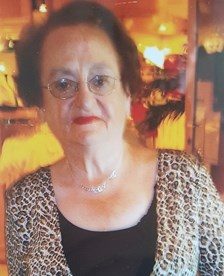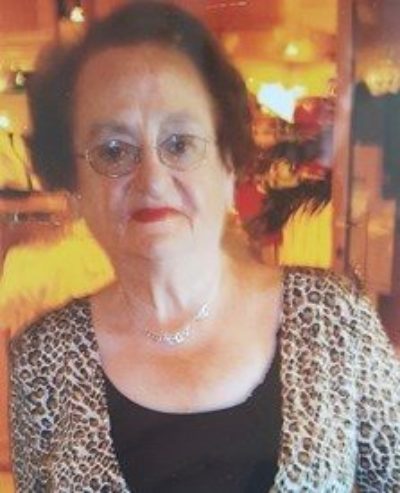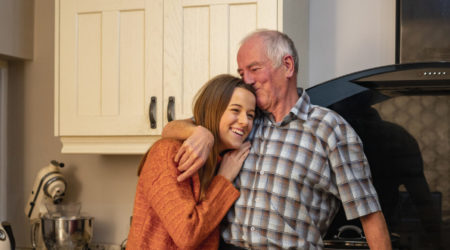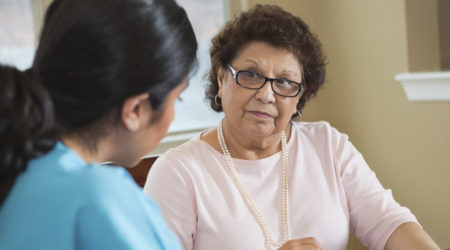



Ros
Ros story of her mother, Dorothy, who was diagnosed with pancreatic cancer at the age of 83.
My mother, Dorothy, was 83 when diagnosed. This was following a check-up as she had just undergone major surgery for bowel cancer, and had not recovered as expected. She was found to have an endocrine tumour in the tail of the pancreas.
My mother and I were very close and for the year before her diagnosis, she had been living with me as she became very frail prior to being diagnosed with bowel cancer. She had also had breast cancer 10 years previously and had a double mastectomy.
The hard thing with all this, is that she was told all the bowel cancer had been removed and no further treatment was needed but she continued to have bad back pain, and eventually the doctors listened to mum and said they would do a follow up scan (6 months post-surgery) and then promptly lost the results for 5 weeks which put us both in a heightened state of anxiety as you can imagine! Anyhow, once found, I got a phone call from the Specialist Bowel Cancer Nurse asking us to go in immediately, and suggesting someone came with.
Receiving the bad news
As a social worker, I knew when that was said it was very bad news, I had seen many people with pancreatic cancer and knew it was not one of the most curable cancers so I asked my grown son to come with, which I am glad he did. It was a very hard thing for him to witness. He was exceptionally close to mum as well, because I had been a single mum and she had helped raise my boys. The consultant profusely apologised (I didn’t blame him personally) for the admin error. He then went on to tell us the devastating news that a further tumour had been found on the pancreas and they didn’t feel it to be a secondary, but another primary tumour, which made it even more shocking if that was possible. Why my mum had 3 separate cancers I couldn’t accept, it seemed so cruel but that is what cancer is I knew.
She had just had major surgery which she had a big struggle to recover from, so she immediately said she didn’t want any further treatment, and although the consultant said it had been found very early due to monitoring of her bowel, and that it might be operable if she had been stronger, he felt she wouldn’t survive the major surgery so he concurred with her decision. It was so hard for all of us, my mother sobbed for the first time since getting cancer, and so did my son, even the consultant had tears in his eyes, my heart just broke there and then and I knew I would lose my beloved mum who was so dear to me. The Specialist Nurse and the Consultant who we were subsequently referred to were very supportive and treated us all with dignity, respect and patience which I will always be grateful for.
Unfortunately, because of the loss of scan results, my mother remained in denial for many months, and this was hard for me as although initially she remained fairly well, and continued attending her beloved day centre and was involved in everyday life, I knew she had to start accepting her diagnosis in order to prepare herself. The staff were very good, accepted their error had played a part in this, and offered ongoing counselling. Although she was referred to palliative care in our local area, it was very under resourced and not much was offered. I had to argue for NHS funding through continuing care (luckily I was able to do this as the social worker attached to my local area was not very informed!) and the home carers that were eventually sent were very inconsistent and varied as to their capability, but it soon became clear to me that unfortunately I would not be able to care for mum until the end as there just wasn’t the resources to provide the round the clock care that I knew she would eventually need.
Caring for my mum
However, I was fortunate in that I had worked for many years with terminally ill people, so I was able to access a neighbouring hospice eventually, and with much stress and work negotiating the politics of it all, and after several months as she became a little more unstable with her pain and sugar levels, she started there for day care assessment. I thank God every day that this was the case, as from then on, mum received specialist medical attention and more importantly spiritual and emotional support to enable her to accept her disease and how it would progress which was a very hard thing for her to do.
Mum stayed with me sleeping downstairs and with the brilliant support of Marie Curie nurses twice weekly and nights twice weekly from an agency so I could get some sleep, whilst going to the hospice for day care. However, this was so stressful for me. I couldn’t sit and enjoy my mum so much as I was constantly concerned about her pain, the fact she was going into hospital frequently as her diabetes went out of control due to the disease.
I had to be a nurse giving insulin (she only had tablets before), caring for her most intimate hygiene needs as she became less mobile which was hard for us both being private people. The outcome of months of this was that she felt a burden (which she never was) and lacking in dignity, and I was nearly at breaking point, as my chronic health problems became significantly worse with the stress, it became a crisis situation.
The difficult thing with pancreatic cancer as I see it, is that it and its symptoms are very individual and unpredictable making it very stressful for the carer and relative and a roller coaster of emotions. I would be elated one minute that she was still with us after 6 months and relatively pain free, but then devastated as she would go unconscious with sky high sugar levels. I had worked with carers and the terminally ill for 20 years or more, and I never fully anticipated the strain and toll it took on everyone. Nevertheless, despite the difficulties, we still had some wonderful moments like when her great grandson was born 3 months after diagnosis, and the times she had with her grandchildren and great grandchildren and friends of which she had many. It is comforting for me now to hold on to these memories and to try to push aside the not so nice ones.
Mum was admitted to the hospice once bedridden and was cared for there with love, kindness and much expertise. She remained there for 10 weeks, I think due to the good care she received. She felt safe there and the best thing was I was able to spend quality time with her and be her daughter not the carer that I had been for almost two years. Her disease from diagnosis to end of life lasted 11 months. Most people are not diagnosed until late on, we knew very early so the progress of the disease seemed slower.
Dealing with the impact on me
The stress gave me pneumonia which I had for the last week of mum’s life unfortunately, which made it a little more difficult than it already was. Not everyone wants to or can go into a hospice, I just wanted to let people know not to be frightened of the word ‘Hospice’. They ensured she remained relatively pain free until the end, and they were there for me as much as they were for her and support was offered even after her passing. I just wish palliative care was higher on the political agenda, there should be far more support in the community than there is. Macmillan, Marie Curie etc., are exceptional, but in some areas as in mine, very thin on the ground. There should be no postcode lottery when dealing with pancreatic cancer or any other terminal disease.
The outcome for pancreatic cancer is the same as it was decades ago, this shouldn’t be, it costs so much to pick up the pieces of carers’ ill health etc. We need to do something and try to improve the statistics. I have had to have counselling and my health has been poor since her death last year, but I don’t regret for a second the time I had caring for mum, but realise it may not be possible for everyone and I ask myself who will pick up the pieces then? I pray research improves for the generations that are to come, and as I try to pick up the pieces of my life, which is very hard to do, I aim to do what my health enables me to do, to contribute to this wherever I can.
November 2016



